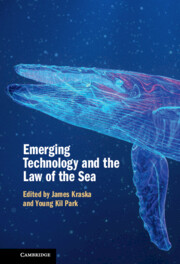Book contents
- Emerging Technology and the Law of the Sea
- Emerging Technology and the Law of the Sea
- Copyright page
- Contents
- Contributors
- Preface
- 1 Emerging Technology and Maritime Boundary Dispute Resolution
- 2 Renewable Energy and the Law of the Sea
- 3 Striking an Equitable Balance under the Biodiversity Agreement
- 4 Small Modular Reactors and Transportable Nuclear Power Plants
- 5 Shipping, Distributed Ledgers and Private Maritime Law
- 6 Maritime Cyber Security
- 7 International Standards for Hull Inspection and Maintenance of Robotics and Autonomous Systems
- 8 Functionalism and Maritime Autonomous Surface Ships
- 9 Artificial Intelligence to Facilitate Safe Navigation of Ships
- 10 Unmanned and Autonomous Warships and Military Aircraft
- 11 Seabed Technology and Naval Operations on the Continental Shelf
- Index
1 - Emerging Technology and Maritime Boundary Dispute Resolution
Published online by Cambridge University Press: 07 July 2022
- Emerging Technology and the Law of the Sea
- Emerging Technology and the Law of the Sea
- Copyright page
- Contents
- Contributors
- Preface
- 1 Emerging Technology and Maritime Boundary Dispute Resolution
- 2 Renewable Energy and the Law of the Sea
- 3 Striking an Equitable Balance under the Biodiversity Agreement
- 4 Small Modular Reactors and Transportable Nuclear Power Plants
- 5 Shipping, Distributed Ledgers and Private Maritime Law
- 6 Maritime Cyber Security
- 7 International Standards for Hull Inspection and Maintenance of Robotics and Autonomous Systems
- 8 Functionalism and Maritime Autonomous Surface Ships
- 9 Artificial Intelligence to Facilitate Safe Navigation of Ships
- 10 Unmanned and Autonomous Warships and Military Aircraft
- 11 Seabed Technology and Naval Operations on the Continental Shelf
- Index
Summary
Where the maritime claims of adjacent or opposite coastal states overlap with one another, a potential maritime boundary exists. Thanks to the extensions of maritime claims offshore, the number of potential maritime boundaries has substantially increased and only around half of potential maritime boundaries have been even partially settled. The role of technology in the evolution of maritime boundary delimitation is outlined. Emerging technologies, especially space-based infrastructure, are explored and found to have an increasingly important role to play in the determination of the location of the land/sea interface at the coast and thus the baselines from which equidistance lines are calculated as well as in terms of positioning technologies, allowing the realization of a coherent global geodetic reference system. The role of emerging technologies in the context of maritime boundary dispute resolution is also considered.
Keywords
Information
- Type
- Chapter
- Information
- Emerging Technology and the Law of the Sea , pp. 1 - 34Publisher: Cambridge University PressPrint publication year: 2022
